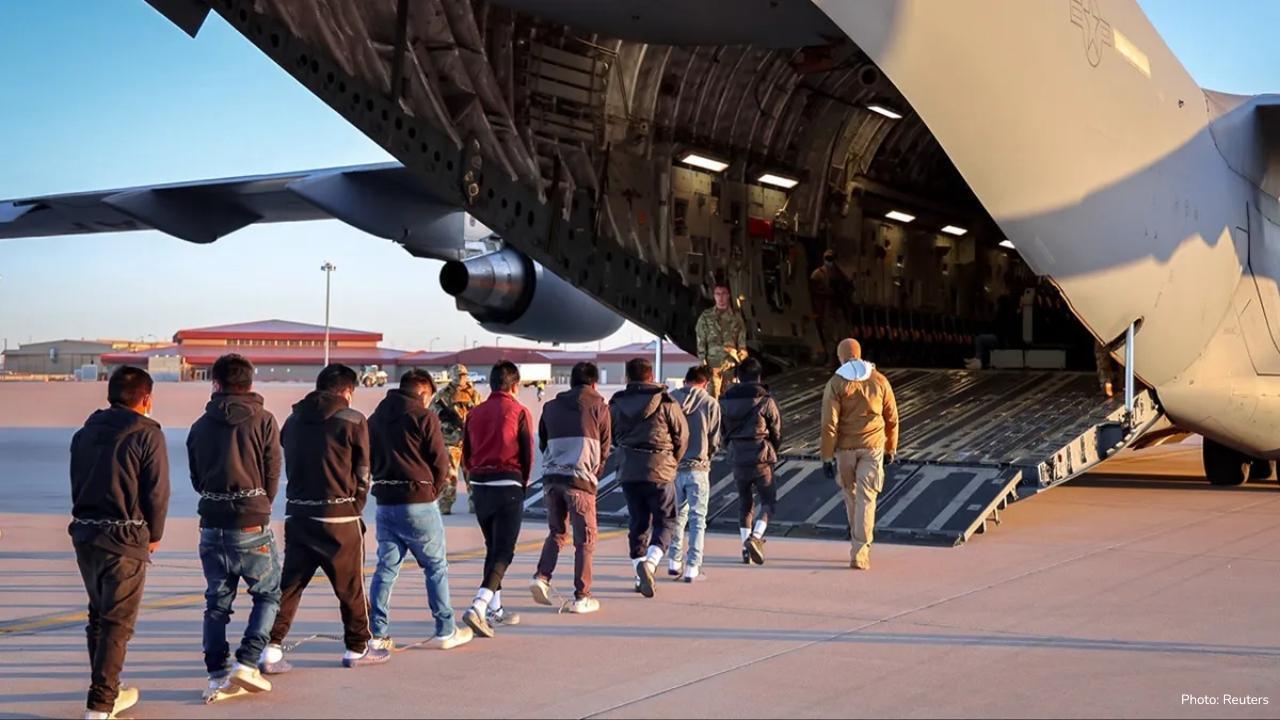
Post by : Monika
On September 30, 2025, Yemen’s Houthi rebels announced that they were imposing sanctions on several major U.S. oil companies, including ExxonMobil, Chevron, and ConocoPhillips. This announcement came from the Humanitarian Operations Coordination Center (HOCC), a body set up in Sanaa, Yemen, to coordinate between Houthi forces and commercial shipping operators. The HOCC said the sanctions cover 13 companies, nine executives, and two vessels.
These sanctions are being introduced as a response to U.S. sanctions imposed on the Houthis earlier this year. The U.S. sanctions were placed despite an existing truce agreement between the Houthis and the Trump administration. Under that truce, the Houthis had agreed to stop attacking ships linked to the United States in the Red Sea and the Gulf of Aden.
It remains unclear whether these new Houthi sanctions will lead to direct attacks on vessels associated with the sanctioned companies. Mohammed Albasha, a Middle East analyst, noted that such attacks could risk breaking the ceasefire that had been facilitated by Oman.
History of Houthi Attacks on Shipping
Since 2023, the Houthis have carried out several attacks on ships in the Red Sea. They have said these attacks are targeted at vessels connected with Israel, showing solidarity with Palestinians in the ongoing conflict with Israel. While these attacks have been alarming, they have had minimal impact on oil tanker traffic through the Strait of Hormuz. This strait, located between Oman and Iran, is a vital route connecting the Persian Gulf with the Gulf of Oman and the Arabian Sea.
The Houthis have also occasionally targeted ships in the Gulf of Aden, which connects the Red Sea to the Arabian Sea. On Monday, the Houthis claimed responsibility for attacking a Dutch cargo ship in this area using a cruise missile. This attack injured two crew members and left the ship on fire and drifting at sea.
Impact on Oil Trade and the Global Market
Despite these threats and sanctions, analysts believe that the impact on global oil markets will be limited. The U.S. Energy Information Administration reported that in 2024, the United States imported about 500,000 barrels per day of crude oil and condensate from Gulf countries through the Strait of Hormuz. This represented only about 7% of total U.S. crude imports, the lowest level in nearly 40 years, largely due to increased domestic production and imports from Canada.
Most oil trade in the region is conducted by companies from China, Russia, Iran, and other Gulf nations. These are countries that the Houthis are trying to maintain good relations with, so they are unlikely to be affected by the sanctions. Experts suggest that the move by the Houthis is more symbolic, meant to reassure their population and signal that they are responding to U.S. pressure and Israeli strikes that have affected Yemen’s economy.
Purpose of Houthi Sanctions
The HOCC stated that the ultimate goal of the sanctions is not punishment but to encourage positive behavioral change. By targeting companies, executives, and vessels, the Houthis are sending a message to the U.S. and the international community while trying to strengthen their domestic standing. Analysts have described this as a media-driven action intended to demonstrate power and influence without causing a major disruption in the oil trade.
U.S. and Company Reactions
ExxonMobil declined to comment on the sanctions. Chevron also did not immediately respond. The U.S. government has not indicated any immediate plans to respond to the sanctions. However, there is concern that if these sanctions were to escalate into physical attacks on vessels or assets, it could increase tensions in an already volatile region.
Regional Security and Maritime Concerns
The Red Sea and Gulf of Aden are important shipping routes for global trade, including oil. Any disruption in these waters could affect the shipping of goods and fuel worldwide. The Houthis’ previous attacks have caused alarm among shipping companies and countries that rely on safe passage through these waters.
The Strait of Hormuz is particularly significant because it connects the Persian Gulf with the Arabian Sea and the Gulf of Oman. Although Houthi attacks have not yet significantly disrupted tanker traffic, the risk of escalation remains. International observers are closely monitoring the situation to ensure that shipping lanes remain safe.
Houthi Motivations
The Houthis are supported by Iran and have been involved in the Yemen conflict since 2014. They fight against the internationally recognized Yemeni government, which is backed by a coalition led by Saudi Arabia. The Houthis often justify their attacks on shipping and oil companies as acts of solidarity with Palestinians and as a response to Israeli actions in Gaza.
In addition to regional politics, domestic pressures also play a role. The Houthis face economic hardships due to U.S. sanctions, Israeli airstrikes, and the ongoing conflict. The sanctions against U.S. companies allow the Houthis to show their population that they are taking action and standing up against foreign pressure.
International Observers
Experts, including Mohammed Albasha, have described the sanctions as a "media stunt" rather than a serious threat to global oil trade. The primary purpose appears to be domestic political messaging rather than actual economic warfare. Nonetheless, the move is being watched closely by shipping companies, international regulators, and countries dependent on oil imports.
Potential Consequences
If the Houthis decide to escalate their actions, it could lead to attacks on vessels linked to the sanctioned companies. Such attacks would violate the existing ceasefire agreement and could provoke retaliation from the U.S. or allied countries. This could increase instability in a region already facing multiple conflicts, including tensions between Iran, Saudi Arabia, and Israel.
On the other hand, if the Houthis keep the sanctions symbolic and avoid direct attacks, it could allow them to maintain leverage without disrupting trade or inviting military retaliation. This approach could help preserve the ceasefire while demonstrating their political strength.
Humanitarian Context
Yemen has been facing one of the world’s worst humanitarian crises for years. The ongoing conflict has caused severe shortages of food, water, electricity, and medical care. By focusing on sanctions rather than attacks, the Houthis may also aim to prevent further worsening of humanitarian conditions, especially in ports that are essential for importing food and aid.
The Red Sea and Gulf of Aden are critical for delivering humanitarian aid as well as commercial goods. Any escalation could affect the ability of aid organizations to bring supplies into Yemen, which would worsen the situation for millions of civilians.
Global Implications
The sanctions have limited immediate impact on global oil prices because U.S. imports from the Gulf are relatively low compared to total domestic consumption. However, any escalation could increase insurance costs for shipping companies and create uncertainty for traders. Countries that rely on Gulf oil may monitor the situation carefully, even if the immediate economic effect is minor.
The Houthis’ actions highlight the complex nature of Middle East conflicts, where local disputes, regional rivalries, and global economic interests intersect. The sanctions serve as a reminder that even symbolic gestures can have international consequences, especially in areas critical for trade and energy supply.
Yemen’s Houthis have imposed sanctions on U.S. oil companies, executives, and vessels as a response to American penalties. While the immediate economic impact is expected to be minimal, the move is significant politically and symbolically. It shows how the Houthis are responding to external pressures and trying to strengthen their position domestically.
Analysts believe the sanctions are likely a media-focused action designed to send a message to the U.S., Israel, and other regional actors, rather than an immediate threat to global oil supply. Nevertheless, international observers, shipping companies, and governments will continue to monitor the situation closely.
The Houthis face a delicate balance. Escalating attacks could provoke military responses, while keeping actions symbolic allows them to maintain influence without breaking the truce. Meanwhile, the humanitarian situation in Yemen remains critical, and safe passage through the Red Sea and Gulf of Aden is essential for both trade and aid delivery.
The coming weeks will reveal whether the Houthis will escalate their sanctions into physical actions or keep them as a symbolic statement. The decision will affect regional security, international trade, and the already fragile humanitarian situation in Yemen.
The global community, shipping companies, and regional powers are closely watching Yemen’s next moves. The Houthis’ actions remind the world how conflicts in one country can ripple through global markets, international relations, and security arrangements, particularly in regions as strategically important as the Red Sea and Gulf of Aden.
Yemen Houthis U.S. oil companies










Gaza Aid Flotilla Faces Unidentified Vessels, Enhances Security
Global Sumud Flotilla reports unlit boats approaching, prompting increased safety measures as they d

U.S. Reduces Military Role in Iraq, Shifts Focus to Syria
The U.S. is scaling back its military presence in Iraq, transferring security responsibilities to th

US Deports 100 Iranians in Deal with Tehran
The US has deported 100 Iranians back to Iran after a deal with Tehran. This marks a rare cooperatio

Pope Leo Hopes Hamas Will Accept Trump's Gaza Peace Plan
Pope Leo expresses hope that Hamas will accept Trump's 20-point Gaza peace plan, urging respect for

Italy Ends Navy Support for Gaza Aid Flotilla Amid Tensions
Italy withdraws naval escort for Gaza-bound aid flotilla, citing risks of Israeli interception. Acti

Yemen's Houthis Sanction U.S. Oil Firms Amid Tensions
Yemen's Houthis impose sanctions on U.S. oil giants like ExxonMobil and Chevron, raising concerns ab